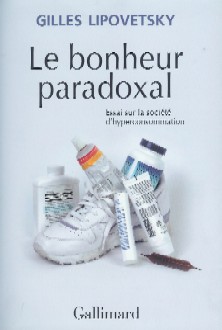
In his new essay on “paradoxical happiness,” Gilles Lipovetsky affirms, with supporting figures—and some are quite worrying—that capitalism has successfully donned the guise of hyperconsumption to subtly infiltrate the heart of our most innocuous behaviors. The author’s introduction on the “three ages of capitalism” should not be illusory. After the standardized production of the Fordist economy and mass consumption where seduction replaces coercion, here come the times of “emotional consumption.” However, this third phase cannot constitute the age of reason: “we are only, the essayist confides, at the very beginning of the hyperconsumption society.” This no longer settles for goods meant to relieve housewives of daily chores. The purchase becomes a personalized project: there is indeed a search for comfort, but it gains an identificatory dimension. It is based on an internal harmony concern, almost touching upon a philosophical quest. Humans acquire “objects to live with.” Purchasing is understood primarily as an internal experience, an exhilarating and meaningful moment. With the aid of commercial structures, marketing, advertising, and communication, adjustments have been made to account for developments. They have noted the share of non-working time, which represents 82 to 89% of the total waking time of an individual in developed countries. As with leisure expenses, which have increased faster than the general consumption average.
It’s no longer a product being sold but a “vision.” The “universe” of the supermarket now replaces the “aisle,” a designation as sad as it is outdated. It opens onto an imaginary both temporal and spatial: entering a shop should resemble disorientation, an exotic trip to a distant horizon. This brief moment, says the author, eases the “constraints of reality.” Happiness could thus be within reach. Yet this is not the case. It is an endless race for innovation aimed at inciting the insatiable consumer appetite, a generalized brand-zapping in an inflationary wave of launches and recurring offers, “sensory marketing” to create desire and eliminate any risk of saturation—none of it works. Children, Seniors, night trade, travel-consumer, chrono-competition, “turbo-consumerism” is in a frenzy, but not us! The economic system subjects the individual to an injunction to enjoyment by providing perpetual novelty. Like sexuality, consumption is portrayed as a bottomless pit. The consumer becomes a “collector of experiences.” Ultimately leading only to dissatisfaction. A paradox scanned by Gilles Lipovetsky: in this civilization that praises paradise on earth, the author notes the “explosion of depression and anxiety.” He records the multiplication of “symptoms of self-esteem deterioration.” He finally observes the increase in “disappointments that punctuate individual lives.” Futile attempts at explanations are proposed. Logic of depersonalization accompanying consumer autonomy? Addictive dependency on comfort? Infantile illusion of omnipotence tied to the act of purchase? Depletion of the principle of individuation and the correlative rise of the tribalization of emotions, or “the ‘I’ in quest of ‘we’” as Jean-Claude Guillebaud more simply put it? The author does not rule out any avenue in attempting to elucidate this mystery of “paradoxical happiness.” But where he seeks to identify the existence of obstacles to the realization of pleasure, one might counter that there is precisely a lack of them to achieve it. Desire is longing, to borrow a famous psychoanalytic maxim. He questions elsewhere the “meaningless void of suffering”: unable to grasp the full meaningful—even enigmatic—message contained in the expression of pain. He circles around the question of the “violence of happiness” like a geologist around a giant crater: striving not to fall in. In conclusion, Gilles Lipovetsky quotes the philosopher Nietzsche. Given the extent of the damage, one might rather wish to counter with one of his masters, Schopenhauer: “The satisfaction the world can give our desires is like alms given to a beggar today, sustaining him enough to be hungry again tomorrow.”
Gilles Lipovetsky, Paradoxical Happiness, Essay on the Hyperconsumption Society, Gallimard, 2006, 361 pages, 21 Euros.
jlvannier@free.fr 06 16 52 55 20


